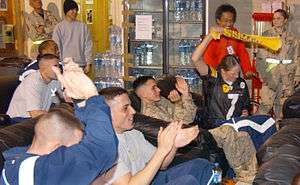Super Bowl Sunday
| Super Sunday | |
|---|---|
 United States Air Force Super Bowl Party. | |
| Official name | Super Sunday |
| Also called | Super Bowl Sunday |
| Observed by | United States, Canada, and internationally |
| Begins | 1967 |
| Date | First Sunday in February |
| 2017 date | February 5 |
| 2018 date | February 4 |
| 2019 date | February 3 |
| 2020 date | February 2 |
| Frequency | annual |
Super Bowl Sunday is the day on which the Super Bowl, the National Football League (NFL)'s annual championship game, is played. It is usually observed on the first Sunday in February and is sometimes referred to as an unofficial national holiday. The 52nd annual event, Super Bowl LII, occurred on February 4, 2018. Festivities for Super Sunday typically involve groups of people gathering to watch the game. Both "Super Sunday" and "Super Bowl Sunday" are registered trademarks of the National Football League.[1]
Festivities
Although not an official holiday, Super Sunday is an occasion when many families and friends gather together to watch the game, including those who are not normally football fans.[2][3] Although sports bars have historically been busy on Super Sunday in the past, it is becoming more common for people to watch the game from home. This is due in part to the increasing size of home televisions in the United States as well as the attempts of budget conscious consumers to save money.[4][5]
Because watching the Super Bowl is so popular, stores are often empty during the game, particularly in the regions represented by the two teams playing in the Super Bowl,[6] and water usage drops, with significant rises in use during halftime and after the game, as fans use the bathroom.[7] Additionally, churches sometimes cancel afternoon or evening services on Super Sunday, hold football-themed charity drives, or deliver sermons designed to appeal to male members of the congregation.[8][9][10]
NFL executives have called for a three-day weekend in order to allow fans to celebrate the event, and there is thought to be a loss of productivity in the American work force on Monday after the event.[11][12] The television network carrying the game (either CBS, Fox, or NBC) will usually devote the entire day's programming schedule to the game, with extended pregame shows, NFL Films retrospectives of the previous season, and special versions of the Sunday morning talk shows in the morning and afternoon hours leading into the game. Competing networks, due to the severe loss of viewers to the Super Bowl festivities, generally resort to low-cost counterprogramming measures like the Puppy Bowl.[13]
Food
Large amounts of food and alcohol are consumed on Super Sunday.[11][14][15] The event is the second-largest food consumption event in the United States, behind only Thanksgiving dinner,[16] and some police departments have noticed a dramatic increase in drunk driving on Super Sunday.[15]
Super Sunday food is usually served buffet style, rather than as a sit-down meal. Foods traditionally eaten on Super Sunday include buffalo wings, chili, baby back ribs, dipping sauces, pizza, and potato chips.[16][17] Many pizza delivery businesses see their order numbers double as roughly 60 percent of the take out ordered on Super Sunday is pizza. Roughly 28,000,000 pounds (13,000,000 kg) of chips, 1.25 billion chicken wings, and 8,000,000 pounds (3,600,000 kg) of guacamole are consumed during Super Sunday.[17][18]
References
- ↑ The Super – Trademark – Bowl. American University
- ↑ Stellino, Vito (February 6, 2010). "Super Sunday feels like a holiday". The Florida Times Union. Retrieved February 6, 2011.
- ↑ Gay, Jason (February 4, 2016). "Should the Super Bowl Be a Holiday?". The Wall Street Journal. Retrieved November 13, 2016.
- ↑ Jargon, Julie (February 3, 2011). "Sports Bars Play Super Bowl Defense". The Wall Street Journal. Retrieved February 6, 2011.
- ↑ Halls, Sarah (February 5, 2011). "Where to Watch the Super Bowl in Europe". The Wall Street Journal. Retrieved February 6, 2011.
- ↑ Bollier, Jeff (February 6, 2011). "Oshkosh shuts down for Packers, Super Bowl". The Northwestern. Oshkosh, Wisconsin. Retrieved February 6, 2011.
- ↑ Calder, Rich (February 9, 2012). "Toilet Bowl XLVI". New York Post. Retrieved February 1, 2018.
- ↑ "Some churches cancel Super Sunday services". The Victoria Advocate. Victoria, Texas. Associated Press. February 3, 2011. Retrieved February 6, 2011.
- ↑ Draper, Electa (February 5, 2011). "Some preachers use Super Bowl to put focus on harm of pornography". Dever Post. Retrieved February 6, 2011.
- ↑ Kloosterman, Stephen (February 6, 2011). "Churches see Super Bowl as a time to connect with worshippers". Holland Sentinel. Holland, Michigan. Retrieved February 6, 2011.
- 1 2 Flint, Joe (February 4, 2011). "NFL has made Super Bowl Sunday into a holiday, is a three-day weekend the next step?". Los Angeles Times. Retrieved February 6, 2011.
- ↑ Riccobono, Anthony (February 1, 2015). "Should The Monday After The Super Bowl Be A National Holiday?". International Business Times. Retrieved November 13, 2016.
- ↑ Ryzik, Melena (February 2, 2008). "Just Fine as Tackles, but They Can't Pass". The New York Times. Retrieved February 1, 2018.
- ↑ Deford, Frank (January 28, 2009). "Super Bowl Sunday is a holiday". CNN. Retrieved February 6, 2011.
- 1 2 Zellermayer, J (February 6, 2011). "Super Bowl Sunday drunk driving crackdown". WGN-TV. Associated Press. Retrieved February 6, 2011.
- 1 2 Corwin, Tom (February 5, 2011). "Super Bowl party food need not send diets crashing". The Augusta Chronicle. Augusta, Georgia. Retrieved February 6, 2011.
- 1 2 Lynott, Jerry (February 1, 2011). "Score super snacks". The Times Leader. Wilkes-Barre, Pennsylvania. Retrieved February 6, 2011.
- ↑ Edge, Lisa (February 4, 2011). "Super Sunday means big business for food industry". WPDE. Retrieved February 6, 2011.